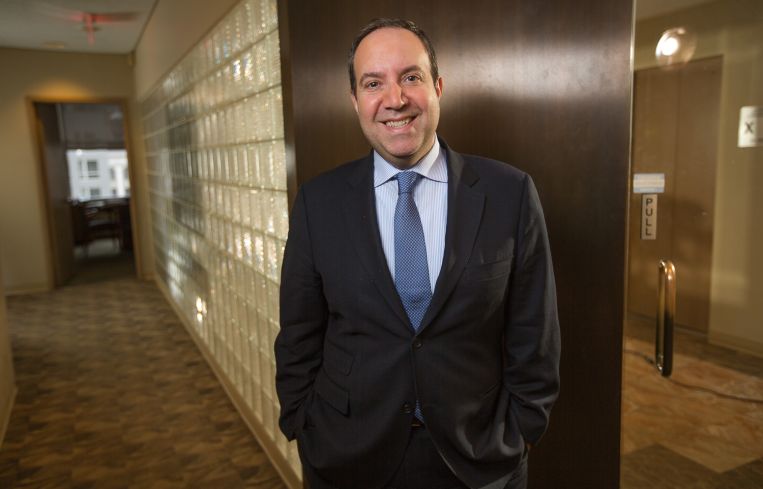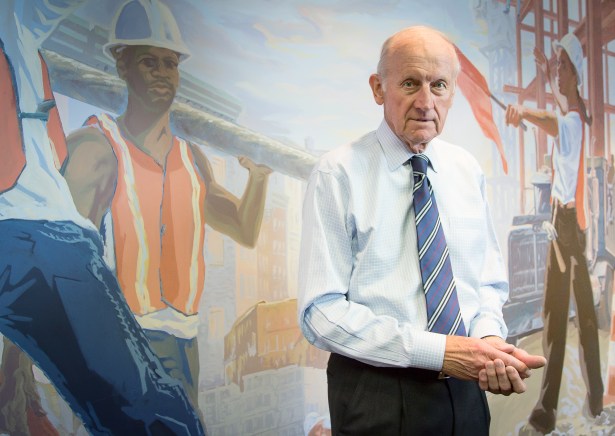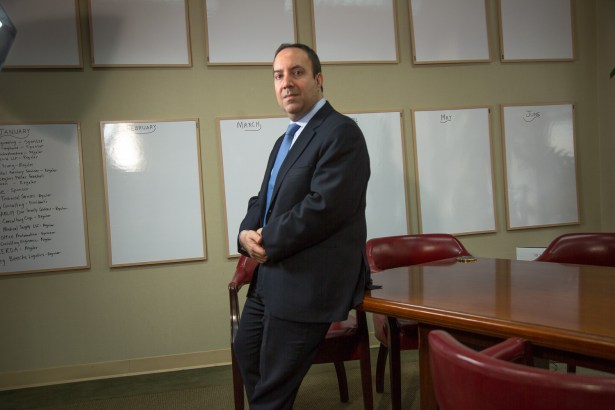Meet Carlo Scissura, the New Head of the New York Building Congress
By Terence Cullen February 8, 2017 10:30 am
reprints
It’s a damp Friday morning, and Carlo Scissura is at his desk in NoMad.
At this point, he has barely two weeks on the job as the new president and chief executive officer of the New York Building Congress—having held the same positions at the Brooklyn Chamber of Commerce. But on his mind, and nearly everyone else’s, is the inauguration of Donald Trump, which is minutes away from starting.
A TV to Scissura’s right plays NY1’s live coverage of the event. In case he missed a second of it, there is also a feed of the event displayed on The New York Times homepage on a computer to his left.
For a career Democratic operative like Scissura, this would probably be the point of a nightmare when one awakes, drenched in sweat and gasping for air. But for the New York City construction industry’s newest advocate, he chooses to see it as big moment for his organization, which counts more than 400 companies representing 250,000 professionals as members.
“It’s an exciting time, obviously, to be running a citywide organization with all the changes,” Scissura, 46, told Commercial Observer last month. “We’re watching the inauguration of a New Yorker who talks about infrastructure, so that’s exciting. I want the Building Congress to lead the infrastructure discussion. We will plan to be in Washington to meet with the people who are going to be making the decisions on nationwide infrastructure planning.”
Indeed, Scissura plans to continue the Building Congress’ push for more public works investment in the region, along with several other policy issues it has advocated for during the current building boom. The son of Brooklyn, who spent more than four years as the chief of staff to former Brooklyn Borough President Marty Markowitz, said he wants to take a stronger citywide approach to the Building Congress as more Manhattan-based developers look to build in his home borough as well as the neighboring Queens.
His ascension to the job follows an almost yearlong search to replace Richard Anderson, who led the Building Congress since 1994 before stepping down in December 2016. Scissura, the single father of a 22-month-old daughter who lives in Dyker Heights, has big shoes to fill in succeeding someone widely credited with reviving the 96-year-old trade group. But Anderson and others who know Scissura well say his background in politics, his training as an attorney and his tact for advocacy made him the best person to address the needs of the Building Congress in 2017.
“He was a powerful voice for Brooklyn—a constant cheerleader,” said Timothy King, the managing partner of Downtown Brooklyn-based CPEX Real Estate and a board member of the chamber. “He’s someone people look up to and listen to. I have no doubt that he’ll be a strong advocate, an ally and an asset to the Building Congress.”
Now that he’s in the job, Scissura has big plans for how to take the organization to the next level (but, he said, he’s being pragmatic about it). The construction industry is indeed at a peak, with about $42.1 billion in spending projected for 2017, according to research Scissura’s organization is known for regularly churning out. Since a great deal of that has spread to the outer boroughs, he said the Building Congress will launch a “Five Borough Initiative” that helps explore development opportunities.
“There’s just a lot in the boroughs that I don’t think we’ve touched yet,” he said. “And we should be the leading organization creating these opportunities for my members, so they can build and create jobs and do everything they do.”
And membership is his other priority, as it’s the bread and butter (and a major revenue source at a minimum $1,650 per membership) of what makes the Building Congress what it is. In his first few weeks on the job, the organization has added 22 new members such as brokerage Douglas Elliman, accounting firm Ernst & Young and infrastructure builder Meridiam. If he can get 50 to 75 new members between January and December, it will have been a good first year, he said. (He keeps 12 whiteboards on a wall of his office opposite his desk—one each to list all the new members signed in a given month over the next year.)
“The thing I look at all day long is not a window, is not a TV, it’s members,” he said. “I believe clearly we are a membership organization. I work for all my members and I want to see who the new members are.”
His last four-plus years at the Brooklyn Chamber of Commerce are evidence of his ability to grow membership. Scissura said when he got to the business group in September 2012 there were 720 members; in December 2016, when he left, there were 2,250.
“He’s able to keep a lot of balls in the air at the same time,” said Anderson, now an independent consultant whose clients include the Building Congress. “That’s a very important characteristic for someone to run a diverse membership association.”
As the televised procession continues on to the inaugural platform, Scissura calls to a colleague passing by his office to ask a question. He and a few associates confirm that Iris Weinshall, the chief operating officer of the New York Public Library and former New York City Department of Transportation commissioner, is on TV. Weinshall, also the wife of fellow Brooklynite and Senate Minority Leader Chuck Schumer, is at the time standing near to outgoing First Lady Michelle Obama.

If anyone might know who she is, it’s Scissura. His career up until this point has been about knowing who people in government are, to cultivate relationships with them and to make a given case should the need arise.
His real emergence to the political scene—when he really got to know the business community—was in 2008, when he took over as Markowitz’s chief of staff in the twilight of his second term. What should have been a maybe one-year stint before Markowitz left office turned into more than four working with Markowitz (otherwise term-limited city politicians were allowed to seek a third term in 2009). He described Markowitz—”Mr. Brooklyn,” as Scissura calls him—as “the hardest-working person I’ve ever worked for.”
“Marty would literally cold call corporations and send letters and say, ‘Move your offices to Brooklyn,’ ” Scissura said. “He came in every day with an idea, a vision and a hope to make Brooklyn a better place.”
During their time working together, Markowitz led a campaign to get Apple to open a store in Brooklyn. The borough president went as far as making a video message, holding an iPad, to make his case to the technology giant. There is now one in Williamsburg, and another is slated to open in Downtown Brooklyn.
Markowitz, now a vice president at tourism booster NYC & Company, credited Scissura with helping make his borough presidency a real force in the city—especially for an office that no longer has the clout it used to. Scissura acted as a liaison between Markowitz’s office and the Bloomberg administration, was dedicated when it came to land use issues and helped boost companies coming to Brooklyn, his former boss recalled.
“He was able to really make our office in Brooklyn, I would like to think, among the most effective ever,” Markowitz said. “A lot of that had to do with Carlo’s ability to get things done, and, like I said, navigate personalities.”
Scissura at one point wanted to follow Markowitz’s administration with one of his own. He mulled a borough presidency run in 2013 but opted not to move ahead with it before the campaign really picked up steam. By September 2012, he wound up at the chamber, where he would launch a slew of programs that included the “Brooklyn Made” certification for products manufactured in the borough.
A graduate of Pace University (both undergrad and law school), Scissura is considered by his colleagues to be adept at knowing the way city government—and the power around it—functions and moves along. That’s something they consider crucial to his growth of the business group and was a key reason why he got his current job at the Building Congress.
“He did for the chamber what he’ll do for the congress,” Markowitz said. “And that is make it front and center. That’s what he’ll give the organization: real presence in the halls of Washington, the state and the city as well as among its own members. Members are your constituents and Carlo will never lose sight of that—that’s for sure.”
Anderson said he first met Scissura when the latter was Markowitz’s chief of staff, but the two became involved in each other’s organizations when Scissura went to the chamber. Then, in January 2016, Anderson announced he was leaving the Building Congress after 22 years of building it up—growing membership, becoming a source of research and holding events on construction policy.
Scissura said he wasn’t in the market for a new job—in fact he had just launched a few forward-looking programs at the chamber, some of which would last five years. But he spoke to a few people at the Building Congress, and by midsummer felt that he was ready to lead a citywide organization.
When the Building Congress’ board selected him, Scissura was at lunch in Washington, D.C., with the chamber’s lobbyists. He got a call from the person leading the search, he said, but was told they were not ready to announce his hiring. Naturally, word got around fast. Scissura got another call 15 to 20 minutes later that a reporter from this publication and another from Crain’s New York Business were on to the story.
He recalled having spent the next two and a half hours on a New York City-bound Amtrak train calling as many people as he could. Among them was John Banks, the president of the Real Estate Board of New York, whom he’d known for several years. Banks already had heard that Scissura had gotten the job. Nothing stays secret for long in the New York City real estate world.
Banks told CO he got to know Scissura about seven years ago when the two were on a commission to review the city charter—basically the constitution for the five boroughs. He said he was impressed with Scissura’s knowledge of the government and his ability to navigate it.
“He’s got a great command of general New York City government issues,” said Banks, who was vice chairman of the commission. “He brought a practical side of day-to-day governmental operations. His input was invaluable.”
Of course, replacing a longtime leader like Anderson is a hard thing to do. Banks noted that he was in a similar position in July 2015 when he took over REBNY from longtime leader Stephen Spinola. Scissura, however, would be up to the task, he said.
“Dick Anderson is a hard act to follow,” Banks said. “Carlo was the absolute perfect guy” to replace him.
His first day leading the Building Congress was spent in Albany. The task at hand was letting people know that he was no longer just the Brooklyn guy but the city guy.
“I was running around the Capitol for the whole day,” Scissura said. “It was really about letting them understand it’s not just Brooklyn anymore; I’m looking out for the five boroughs.”

The formal proceedings of the inauguration are just starting up. Timothy Cardinal Dolan, the archbishop of New York, is delivering a benediction. Big Apple power players have descended on Washington, particularly the inaugural platform. Along with Dolan, there is Trump himself, his son-in-law and former CO publisher, Jared Kushner, along with his soon-to-be nemesis Schumer.
While these New Yorkers run the nation’s capital in the next few years, there are still matters back home that Scissura and his new corporate constituents have to deal with.
For starters, the City Council is considering a 21-bill package to curb the growing number of construction fatalities. Debate over some of the measures—particularly one that would mandate apprenticeship programs for workers—has sparked a tug-of-war between the unions and REBNY, Mayor Bill de Blasio and nonunion groups.
Scissura said he and Building Congress members are reviewing the bills, what their impact might be and the financial ramifications. The Building Congress would begin meeting with Council Speaker Melissa Mark-Viverito and other members over the next few weeks. Last week, he urged the speaker to form a task force comprised of the various stakeholders to reach an agreement on some of the more controversial issues surrounding the package.
There’s also the matter of design-build, in which a developer typically partners with an architecture firm to jointly bid on a project. Advocates of the program believe it saves time and money—removing costly steps of a designer bidding, followed by the selection of a developer who could then run into issues with the design. New York City agencies are not allowed to use the process right now, and authorization to do so depends on approval by state lawmakers in Albany.
“He can bring new energy, new context and new relationships with public officials,” Anderson said. “One of the things that we urged him to do was work with the New York City state legislative delegation—that he knows—to encourage them to support design-build.”
De Blasio, who last month lauded Scissura at the Building Congress’ first luncheon of his presidency, told a packed room of the trade group’s members that they needed to do their part to get design-build in New York City.
“There is a lot of reach in this room, there is a lot of fire power in this room,” de Blasio told the sold-out crowd. “We need all your voices to be heard in Albany in these next months because getting design-build authority is going to allow us to create a better city for all.”
Going forward, Scissura said he hopes to take the Building Congress to a new level when it comes to policy. Instead of just testifying on a rezoning or another construction issue, he wants the organization to play a more proactive role. That means starting the discussion to figure out and then execute on the next big Hudson Yards-caliber or major infrastructure project in the city.
“What is the forward-thinking that is not going to start tomorrow, that will maybe start in 10 years?” he said. “How else are we going to tie the boroughs together? The Building Congress really needs to lead the discussion on that and bring stakeholders together.”



